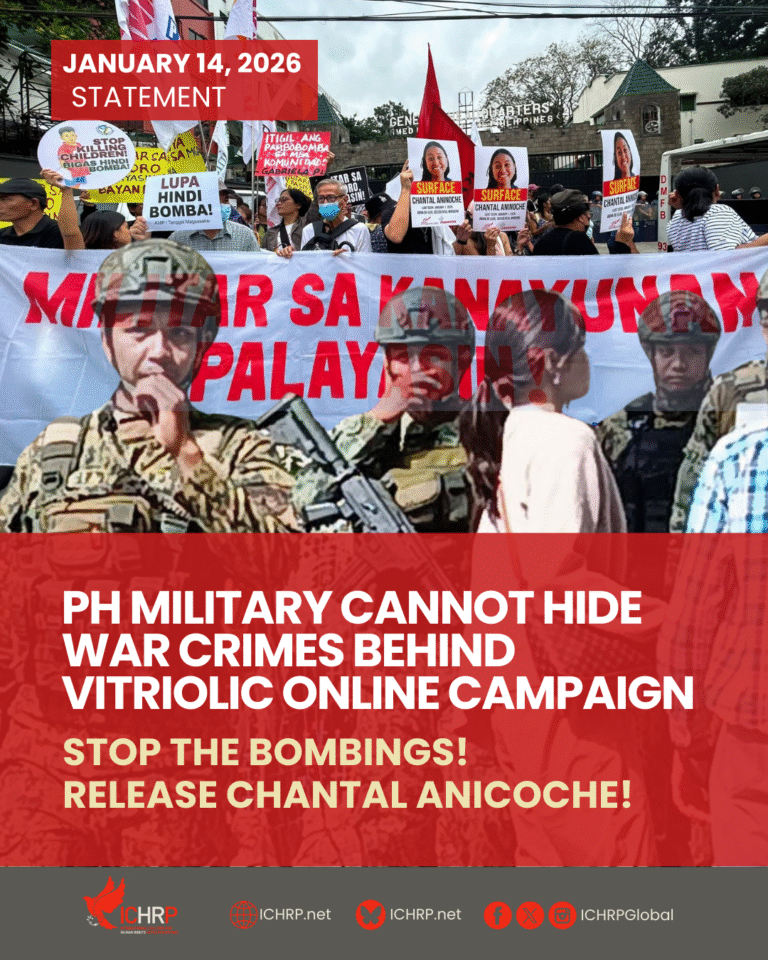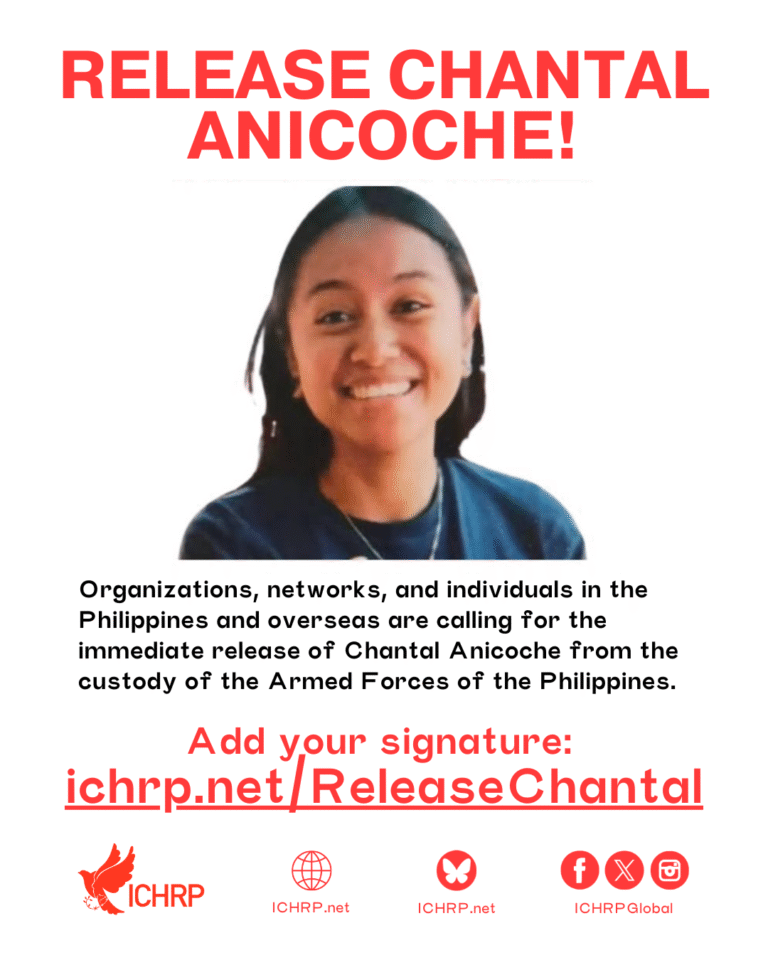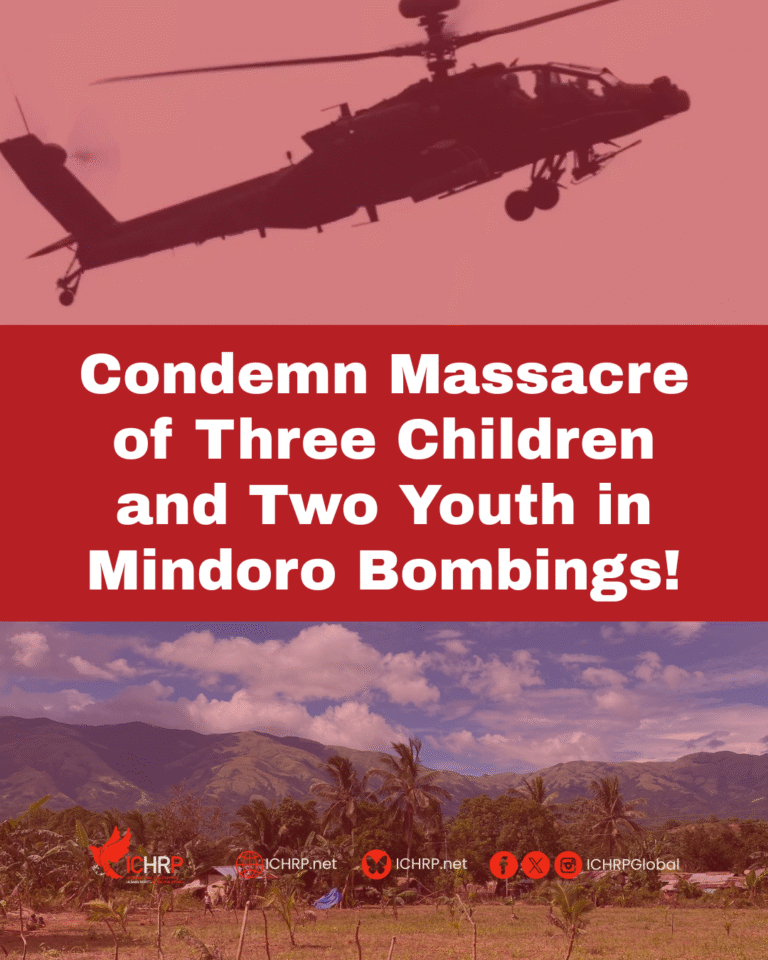Statement
January 14, 2026
Since the Armed Forces of the Philippines’ (AFP’s) New Years Day bombings, massacre and the illegal detention of Chantal Anicoche, the AFP has launched a social media campaign to attempt to divert attention from their massive human rights abuses.
Aided by the National Task Force to End Local Communist Armed Conflict, the AFP is promoting false narratives about “rescuing” Chantal Anicoche, blatantly denying the massive violations of international humanitarian law (IHL) that resulting from its January 1 bombings in Mindoro, and actively attacking social media accounts of human rights groups – including ICHRP. The AFP Southern Luzon Command even openly called ICHRP statements on the bombings “fake news.” If indeed Ms. Anicoche has been “rescued” by the AFP, why does she remain in military custody, and why has she been denied access to humanitarian support?
“The Philippine government is once again attempting to whitewash its rotten record of violations of IHL by attacking our social media accounts with a disinformation blitz. The Philippine government is using its trolls and false narrative in an attempt to hide its bloody crimes against the Filipino people in Abra de Ilog, Mindoro Occidental,” said ICHRP Chairperson, Peter Murphy.
The January 1st bombings – which occurred despite the unilateral ceasefire declared by the New People’s Army that AFP was claiming to attack – resulted in the deaths of three Mangyan-Iraya indigenous children and two youth, including Jerlyn Rose Doydora, a researcher from a university in Manila. The bombs also destroyed crops, farmland, and reportedly killed two cows and three carabaos, severely affecting the agricultural livelihood of the Mangyan indigenous people. According to local government data, 769 individuals were forcibly displaced and evacuated to a local high school.
On January 5, human rights groups Karapatan Southern Tagalog reported that Anicoche was missing and international concern began to grow. On January 7, the AFP’s 203rd Infantry Brigade released videos surfacing Chantal Anicoche. In the videos she appeared scared and under duress as soldiers seemingly found, surrounded, and interrogated her before bringing her to the camp of the 76th Infantry Battalion. According to the narrative of the AFP, all of this occurred on January 7, some six days after the military attack and occupation of Abra de Ilog.
Meanwhile, the AFP and the Marcos Jr government have refused to allow numerous humanitarian missions and independent observers, including Congressional Representative Antonio Tinio, access to Anicoche.
“It’s plausible that rather than finding her on January 7, the military had already taken her during their bombing and ground operations a week earlier. In either event, we can only imagine the suffering and abuse she is undergoing at the hands of the AFP,” said Murphy.
The strategic whitewashing of IHL violations by the AFP has been ongoing under the Marcos Jr regime, as is the ongoing civil war and counterinsurgency policy that continues and intensifies in many areas of the country. According to Murphy, “the false narratives and trolling of ICHRP are a smokescreen to whitewash all the war crimes of the Marcos government”.
“If the Marcos government were serious about IHL, they would rejoin the International Criminal Court and submit to independent investigation of the crimes of bombing of civilians, bombing and occupation of schools, and the ongoing murder of civilian non-combatants. They would also immediately release Ms Anicoche,” Murphy concluded.








